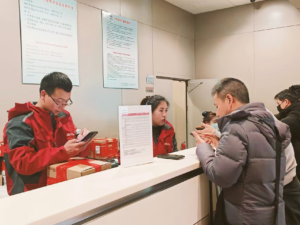Apr 15, 2021|
In-Depth Report: JD Health Reshapes Service for China’s Seniors
by Vivian Yang
JD Health opened the specialized care center for seniors on Mar. 26. The center will focus on using digitalized and intelligent technologies to tackle the pain points and difficulties that China’s geriatric services are facing, said JD Health’s CEO Lijun Xin.
As of the end of 2020, China has about 260 million people aged above 60, accounting for over 18% of the overall population and the number will continue to grow to over 300 million by 2025, rapidly turning the country into an aging society. How to ensure enough quality healthcare services for this population has become a prominent topic for the government, hospitals, businesses and society.
Telemedicine has been playing an increasingly important role in increasing access to doctors and reducing elderly people’s hassles when visiting the hospital.
JD Health’s seniors-centric care center aims to tackle more underlying symptoms that have caused inadequacy and unbalanced distribution of healthcare support in China.
A Full Life Cycle Service
By addressing and preventing the root causes of illness, not just focusing on treatment and cure, JD Health’s platform has been investing its online traffic and big data resources in the areas of health knowledge and management education and early screening of diseases.
On the center’s front web page, users can easily find a variety of knowledge sharing from renowned doctors from specific medical fields. They give useful and tailored advice for elderly people on the prevention and self-examination for COVID-19, anemia, tumors, heart failure, and more.
“Don’t follow hearsay blindly and take unreliable drugs,” wrote Haimei Qi, director of the geriatrics department of Beijing Hospital in her post on the JD Health platform. Dr. Qi is China’s top expert on geriatrics. She summarized 10 important pieces of advice for patients with cardiovascular diseases during COVID-19 and provided a further detailed explanation in three long posts on JD Health. “Learn to manage your blood pressure and measure it from time to time. Don’t suddenly stop taking your antihypertensive drugs. Seek help from your family, friends or community to fetch the drugs for you from hospitals,” she continued.
JD’s trust-based brand identity is an essential reason for many doctors like Dr. Qi to cooperate with the platform. It also gives people confidence to seek credible health-related content. In 2020, active users on JD Health increased by 33.7 million a total of nearly 90 million, achieving 60% growth in the COVID-affected year.
“Thanks for sending me the pill refill reminder every time. This is a very responsible attitude!” a patient with Parkinson’s disease commented on JD Health’s page. In addition to pill refill and reexamination follow-ups, JD Health also extends post-diagnosis support to the services such as pharmaceutical products ordering and delivery, rehabilitation plan development, and providing intelligent health monitoring devices.
A closed-loop service from early warnings for health problems, disease prevention, and medical consultation, all the way down to rehabilitation and nursing service is what JD Health is committed to developing. To realize this, as the vice president of Beijing Hospital, Heng Xi said at the center’s establishment ceremony that JD Health not only needs to play an active role in promoting the “prevention first” concept, but also transcend its role from an e-commerce provider to join forces with all stakeholders including government, medical experts, pharmaceutical manufactures and more to complete an all-embracing service model for seniors.
Customer-centric Treatment
“I posted a question at midnight. Dr. Pan, an attending doctor of neurology at the Third People’s Hospital of the Yichun, Jiangxi province, responded almost immediately and gave me some medical advice,” a user commented on Dr. Laisheng Pan’s main page on JD Health, “I’ve got much better now after using the medicines.” Another user wrote that “[after consulting Dr. Pan online] he followed up on my mother’s illness, with his considerate assistance. I believe my mother will get better very soon.”
Dr. Pan is among over 9,000 doctors in China who have been providing online medical consultations on JD Health. Their active online engagement helps to tackle three issues. First, patients can receive a doctor’s timely responses whenever they need help. The fact is that many doctors from smaller hospitals are not as preoccupied as their peers in the top-tier hospitals, so the internet platform helps gather them online to provide medical services diverting pressures for offline resources to some extent. Meanwhile, JD Health’s in-house full-time doctors can always fill in to ensure timely responses.
Secondly, compared to the doctor visit experience in big hospitals in China which are often crowded and time-pressed, doctors and patients can have more patience to communicate in details online. On JD Health, users have at least 30 minutes to interact with a doctor via text, images, phone calls or video, gaining ample time and attention to address their health concerns.
Thirdly and most importantly, JD Health creates digital health records for users which help doctors to get a fuller picture of their patient’s health status, and make a quick judgment to give precise advice and monitor treatment effectiveness.
“Doctors need to understand and continually track the overall situation of a patient in the aspects of health history, genetic condition, living environment and habits to give more personalized guidance,” Dr. Qi said, raising the importance of the internet in supporting precision medicine.
Jianye Wang, director of China’s national geriatrics center and president of Beijing Hospital also pointed out that mental health is an important factor in measuring senior people’s overall health condition. This is where JD Health’s “Family Doctor” program can play a role. The program is a customized health management service product targeted to family users. With it, doctors can not only maintain regular contact with senior patients but also talk to their adult children for a better assessment of the patient’s overall living condition and work together with them to create a long-term personalized health management plan.
Preparing Talent in Geriatrics
Every time JD Health decides to establish a new specialized medical center, it will go for the country’s top hospitals or experts as its partner or chief academic leader. The reason is that, beyond providing medical services to patients, the platform also sees itself as an accelerator for public health development through doctor-to-doctor communication.
Beijing Hospital is home to China’s only national-level research institute for geriatrics. Its leading experts in this field Dr. Wang and Dr. Qi are both invited as director and executive director of JD Health’s care center for seniors. At the same time, nearly 60 geriatrics experts in the areas of cardiovascular and cerebrovascular diseases, orthopedics, urinary diseases and other chronic diseases form the core team of the specialized care center for seniors.
“We are facing a growing supply gap of geriatric doctors and institutions,” said Dr. Wang. “Geriatrics will develop from being a marginal discipline to becoming a pillar in the future.” According to China’s public health statistical communiqué, as of the end of 2019, there are 3,459 hospitals with geriatrics departments in China, which only account for less than 1% of more than 1 million medical institutions in this country (compared with about 25% in the U.S.), far from enough to catch up with the growing demand.
Dr. Qi recalled that in her early days as a doctor, one patient with minor heart disease symptoms suddenly fell into a fatal situation. Doctors found out later that it was actually the hidden kidney failure that triggered the heart attack.
“There is still a big cognition gap in geriatrics,” Dr. Qi added. “Senior people’s illnesses often have complicated courses and the risk to trigger a domino effect is high. The center will work on cross-disciplinary collaboration, specialist training and standardization to help them prevent and treat these diseases.”
Jianbo Xiao, general manager of the internet hospital of JD Health introduced that JD Health’s care center for seniors will provide resources to support different levels of geriatrics professionals on their career development. Medical school students can find authoritative documentation regarding these disciplines for study; attending doctors can look for medication guidelines and treatment plans on this platform; and experts can arrange medical referrals, conduct case analysis, enhance their influence among their peers and patients via JD Health’s platform.
At the same time, rehabilitation and nursing services are also part of the problem and solution to taking good care of senior people. Xiao said that for the next step, JD Health will also reach out to cooperate with offline nursing houses and communities. With its digitalization capacities and supply chain advantage, the company will continue to integrate online and offline services that can cover all healthcare scenarios for senior people in China, concluded Lijun Xin.

 This Harbin tourism boom has also spurred a surge in sales of winter apparel. JD.com’s data indicates a rapid growth in the sales of warm clothing items such as down jackets, snow boots, and thermal underwear between January 1st and 7th. The sales growth is especially pronounced in southern provinces and cities such as Jiangsu, Zhejiang, Guangdong, Sichuan, and Shanghai. Notably, tall snow boots registered a 206% year-on-year increase in transactions, while padded cotton caps and thickened long down jackets soared by 158% and 134%, respectively. Beyond clothing, travel gear has also seen a considerable uptick, with a 98% year-on-year growth in transactions for large suitcases and travel backpacks in these southern regions.
This Harbin tourism boom has also spurred a surge in sales of winter apparel. JD.com’s data indicates a rapid growth in the sales of warm clothing items such as down jackets, snow boots, and thermal underwear between January 1st and 7th. The sales growth is especially pronounced in southern provinces and cities such as Jiangsu, Zhejiang, Guangdong, Sichuan, and Shanghai. Notably, tall snow boots registered a 206% year-on-year increase in transactions, while padded cotton caps and thickened long down jackets soared by 158% and 134%, respectively. Beyond clothing, travel gear has also seen a considerable uptick, with a 98% year-on-year growth in transactions for large suitcases and travel backpacks in these southern regions.
 JD Books Report: Impact of COVID-19, Gen Z and Lower-tier Markets in China
JD Books Report: Impact of COVID-19, Gen Z and Lower-tier Markets in China



